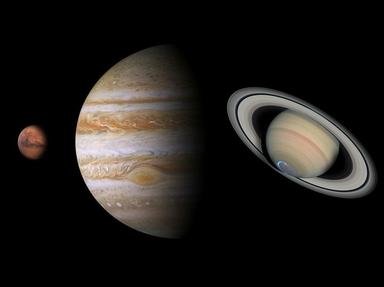Quiz Answer Key and Fun Facts
1. Which of these best describes Venus among the planets?
2. The average surface temperature of Venus is very high - about 737 on which scale?
3. What is the surface gravity of Venus relative to Earth?
4. What is the rotation period (day) of Venus in Earth days?
5. In 1990, which space probe accomplished the most detailed observations of Venus at that time?
6. What is odd about the way Venus spins?
7. On Earth, clouds are composed of water vapor. What do the clouds on Venus consist of?
8. Venus has the least circular orbit of all the solar system's planets.
9. The surface pressure on Venus is equivalent to around how many Earth atmospheres?
10. The first method used to see through the dense clouds covering Venus (in the 1950s) was what?
Source: Author
lordprescott
This quiz was reviewed by FunTrivia editor
rossian before going online.
Any errors found in FunTrivia content are routinely corrected through our feedback system.
